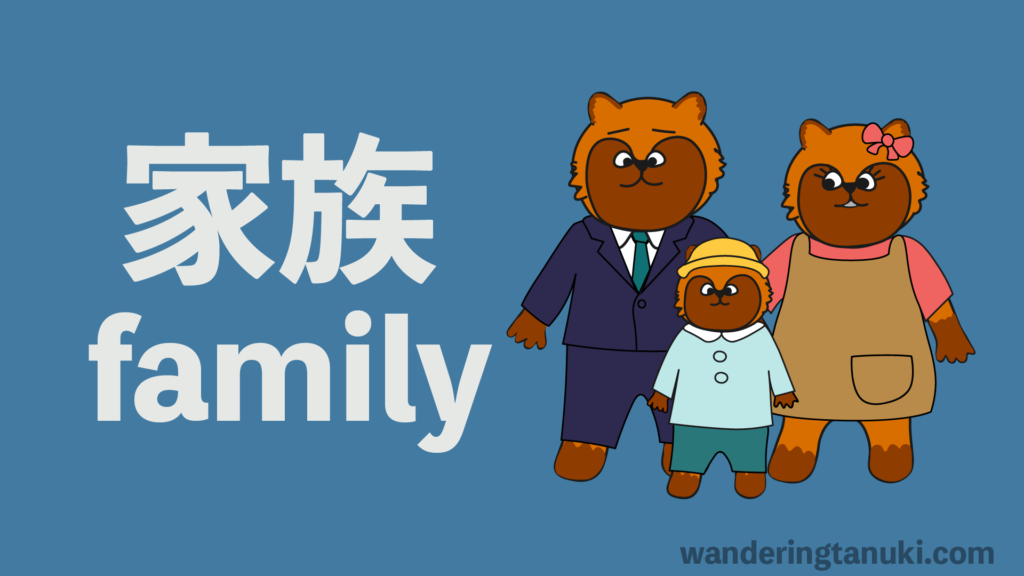How to talk about family in Japanese
Knowing how to talk about your family in Japanese can open up your conversation skills! When talking with strangers and friends, family can be a great topic. The only problem is that talking about family can be difficult to grasp in Japanese!

In this article, I’ll be going over all of the different ways to talk about family and useful phrases.
Talking about your own family vs. Talking about someone else’s family
Before we get into anything specific, it’s important to understand the differences between talking about your own family and talking about someone else’s family! In Japanese, you must use different vocabulary and ways of speech for these two situations.
When talking about your own family you must refer to your family members with no honorifics and in an “impolite form”. This is because they are your own family.
If you’re talking about someone else’s family, you must use a more polite form. Even if you know the other person’s family well, you must refer to them with some kind of honorifics or polite speech.
Finally, it’s important to know how to talk to your family in Japanese. When you are talking to your family, you have many choices. You can call them by their name or with other family words depending on your relationship.
All of these can be confusing, so let’s take some examples:
When talking about your own mother, you can use the word 母(haha). Notice how the word doesn’t include any extra honorifics.
母は元気です。
Haha wa genki desu.
My mother is doing well.
Now let’s look at how you’d ask about someone else’s mother. Depending on how close you are to the other person, you can use お母さん(okaasan) or お母様 (okaasama). The honorifics さん/様 adds additional levels of politeness.
お母様はお元気ですか?
Okaasama wa ogenki desuka?
How is your mother?
At this point you might be wondering how to call your own mother. You actually have lots of choices ranging from formal to super casual. This simply depends on how you grew up and what you become accustomed to saying.
How to say “Family” and “Relatives” in Japanese
Let’s go over how to say the words for “family” and “relative” in Japanese. This can be useful to ask general questions about how someone’s family is doing. In addition, you can use this to describe your own family.
Here are the two ways to say “family:
This is the basic word for family. There is no politeness attached to kazoku so it is best when talking about your own family or your friend’s family. It’s also possible to use this when talking about “family” as a general concept.
You should use this word when you’re talking about someone else’s family in a polite way. If you’re very good friends with the other person, you might be able to use kazoku instead.
There are also two ways to say “relatives”:
In this case, there are no real differences between the two words. However, shinseki might be more common than shinrui.
Members of the Family in Japanese
Here is the vocabulary for members of the family! As I mentioned earlier, there are different words you need depending on if you’re talking about your own family vs. talking about someone else’s family. Some of these words can also be used for multiple situations.
To make things easier, I’ll mark each word with letters that will represent the situation!
P = Polite (Use with strangers, acquaintances, older people, people you need to respect)
C = Casual (Use with friends, and those who are younger than you)
O = Talking about your own family to someone else
S = Talking about someone else’s family
T = Talking to your family member directly
Parents:
This can mean one parent or both parents.
With this word, it is always about both parents.
Mother:
There are many words for mothers, especially for how people call their own moms. I won’t go into all of them here, but try observing how other people call their mom.
This word for mom, is usually only used by men.
Father:
Just like “mother”, there are lots of words that people use to call their own father. I only put the general words here.
Siblings:
For these two words, you don’t have to worry too much about politeness or situation. They can be used to talk about yourself and to talk about others.
In most cases, it’s better to use kyoudai instead of shimai. This is because Kyoudai means “siblings” in general, whereas shimai only refers to female siblings.
Older sister
Note that this word can also be used to refer to people who are not your relative. When used in this context, it just means a woman who’s a bit older than you. An example would be if a child is being babysat by a teenager, they might call them oneesan.
Younger sister
Since a younger sister implies they are younger, they are usually referred to in a more casual way.
Older brother
Like oneesan, oniisan can also be used as a word to describe someone who’s slightly older than you. It’s not always only for relatives.
Younger brother:
Husband:
This one shows more respect for your husband than 夫.
Teishu is used when the husband is “good for nothing” or doesn’t deserve as much respect. If you’re talking about someone else’s husband, it would be best use it while the wife is not around as it could be rude.
Wife:
Unlike tsuma, kanai implies that you feel very close to your wife.
Children:
This is the basic word for “child” in Japanese. This means that anyone can use this word in a general context. When referring to someone else’s child, you should use the other polite words.
Son:
Daughter:
Extended Family in Japanese:
Since there are so many family words, I decided to split the vocabulary into another section for extended family.
These will also follow the same organizing format (if you need to refresh what this means read the previous section!):
P = Polite (Use with strangers, acquaintances, older people, people you need to respect)
C = Casual (Use with friends, and those who are younger than you)
O = Talking about your own family to someone else
S = Talking about someone else’s family
T = Talking to your family member directly
Grandparents:
Saying “grandparents” referring to someone else’s family:
If you’d like to say grandparent referring to someone else’s family, you should say “grandmother and grandfather”. There isn’t really one word people use to indicate grandparents, when talking about someone else’s family.
Grandfather:
Grandmother:
Cousin:
For cousins, there’s basically just one word. Depending on the gender, there are some different ways to write the word in kanji. However, this is not extremely important and I recommend sticking to the hiragana!
Niece:
Nephew:
Uncle:
Aunt:
Grandchild:
In laws:
For describing your in-laws, you would use this phrase. Simply put the family word in the blank.
For example, mother in-law would be:
義理のお母さん – giri no okaasan
Phrases for Describing your Family:
Formality:
As explained before, knowing how to use the level of formality is important! Make sure that you always talk about your own family member in a way that uses no honorifics.
Using particle は(wa):
The particle は(wa) is useful when describing your family. All you have to do is to put the family member + は(wa) + description to form a phrase. は(wa) acts as an “is” in English.
For example, you can say, “my younger sister is a university student”.
妹は大学生です。
Imouto wa daigakusei desu.
My younger sister is a university student.
Useful Phrases:
Here are some other phrases for describing your family.
This is useful if you want to say you have a particular family member. For example
“I have a younger brother” would be 弟がいます (otouto ga imasu).
If you’re an only child, you could say this phrase to describe yourself.
To show the size of your family, you could put a number in the blank. This would usually only apply to the number of immediate family members you have.
Asking about someone’s family:
Formality:
When asking about someone else’s family, make sure to be as polite as possible. If you’re really close friends or much older than the other person, you might be able to get away with using more informal language. However, as a general practice you’ll want to be more formal than if you’re talking about your own family.
Useful Questions:
Here are some questions you can ask someone about their family. When the phrase has a blank, you can add the type of family member.
I hope that this article will help you with learning the vocabulary and phrases for talking about family in Japanese! As you can see, there are lots of different ways to say the word for the family member. Knowing how to navigate this will take some time, and I encourage you to listen to the way that native speakers use the vocabulary. If you’re interested in other Japanese language learning blog content, be sure to check out How to tell the time in Japanese or Japanese Numbers: Count from 1-100 and beyond
~ Tanuki





